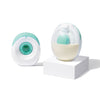Becoming a mom can feel like stepping into a whole new world with its own language. Suddenly, you're thrown into a whirlwind of terms you've never heard before.
One term that might pop up on your radar is "tongue tie,” which can have a big impact on breastfeeding. But what is tongue tie?
Technically called ankyloglossia, tongue ties happen when that little piece of skin under the tongue (scientific term: lingual frenulum) is too short. Imagine trying to stretch a rubber band that's just too snug – that's what's going on under your baby's tongue. This can make it tough for your baby to stick their tongue out or move it freely, and that can spell trouble, especially when nursing.
Now, let's explore how tongue tie can shake up the breastfeeding journey for both you and your little one.
Are Tongue Ties Bad?
Let's dive a bit deeper into tongue tie. There are actually two types: anterior and posterior.
Anterior tongue tie: This is the more common type. It occurs when the thin piece of skin (lingual frenulum) is attached close to the tip of the tongue. It might look like a tiny flap of skin that limits the tongue's upward movement.
Posterior tongue tie: A bit trickier to spot, posterior tongue tie happens when the attachment is further back on the tongue. The frenulum is thicker and might not be as visible, making diagnosis a bit more challenging.
Now, onto the burning questions:
What causes a tongue tie?
The exact cause isn't always clear. Sometimes it's just a quirk of genetics – your baby might inherit it. Other times, it could be a random occurrence during fetal development.
Can I prevent tongue ties from happening?
Prevention is a bit elusive here. It's not something you can predict or control. Genetics seem to play a role, so if there's a family history, it might increase the likelihood. But don't stress too much; it's not something you can actively prevent.
How Does a Tongue Tie Affect Breastfeeding?
Dealing with a tongue tie can make the breastfeeding journey a bit of a rollercoaster, and the impacts can vary. Here's a closer look:
Shallow latch
Imagine your little one struggling to get a good grip. That's what a tongue tie can do—result in a shallow latch. Here's a helpful guide to make sure your baby gets the hang of latching on properly.
Inefficient milk consumption
With restricted tongue movement, babies might find it tough to create the suction needed to nurse. This can lead to frustration for both you and your baby.
Short feeding sessions
Limited tongue mobility often means quicker, less effective feeding sessions. Your baby might tire out faster, leaving you both wondering if they've had enough to eat.
Frustration
The struggle to latch and feed can be downright frustrating. It's a hurdle for both you and your little one, and that frustration can trickle into the overall breastfeeding experience.
Nipple damage
A poor latch, paired with extra suction from your baby compensating for the tongue tie, can result in some serious nipple wear and tear. Ouch! Be sure you are caring for cracked nipples.
Decreased milk supply
When the milk isn't flowing as it should, it can lead to a decrease in supply. Recognizing the signs early is key.
Recognizing a Tongue Tie
It's a common scenario—many parents don't immediately recognize when their little one has a tongue tie. Let's clear up a few misconceptions that often surround this issue:
Myth: All babies who struggle to latch have a tongue tie.
Not necessarily. While tongue ties can certainly contribute to latching issues, different things can affect breastfeeding. It's important not to jump to conclusions. Talking to your doctor is the best way to determine the root cause of any latching difficulties.
Myth: Tongue ties only affect a baby's ability to breastfeed.
Tongue ties can impact breastfeeding, but their effects might go beyond this. Issues like speech difficulties or oral hygiene problems can come up as well. Understanding the broader implications helps in seeking appropriate care.
Myth: All tongue ties require treatment.
Contrary to popular belief, not every tongue tie demands immediate intervention. The decision to treat depends on the severity of the tie and the challenges it presents. Some babies with mild tongue ties adapt well, while others may benefit from a simple procedure known as frenotomy.
How are tongue ties diagnosed?
Diagnosis typically involves a thorough examination by a doctor, often during routine check-ups. Pediatricians, lactation consultants, or specialized healthcare professionals can assess the baby's tongue movement and appearance. Some may use a simple screening tool, while others rely on clinical judgment. In certain cases, further assessment by specialists, such as an Ear, Nose, and Throat (ENT) doctor or a pediatric dentist, may be recommended for a comprehensive evaluation.
Remember, if you suspect a tongue tie or encounter any breastfeeding challenges, seeking help from the pros ensures accurate diagnosis and appropriate guidance tailored to your baby's needs.
What Can I Do for My Baby's Tongue Tie?
If you suspect your baby has a tongue tie, the first crucial step is to consult with your pediatrician or healthcare provider for a professional opinion. However, corrective procedures aren't always the initial response. Here's a guide on what you can do:
Work with a lactation consultant
Lactation consultants are valuable allies in navigating breastfeeding challenges. They can guide you through specific feeding techniques that can help your baby latch more effectively, even with a tongue tie.
Try bottle feeding
Introducing bottle feeding doesn't mean the end of breastfeeding. It can be a helpful alternative, especially if your baby is struggling with latching due to a tongue tie. The Willow Pump is a versatile option that allows moms to pump without feeling tied down and allows moms to bottle feed with expressed breast milk.
Explore other feeding positions
Experimenting with different feeding positions might improve your baby's ability to latch. Some babies find certain positions more comfortable, so don't hesitate to try different approaches to find what works best.
If you and your doctor ultimately decide to correct a tongue tie, the procedure is generally a simple and quick snip.
Your Breastfeeding Questions Answered, With Willow
We've covered the ins and outs of tongue ties, how they can affect breastfeeding, and what you can do about it. If you're navigating the world of breastfeeding and parenting, here's a heads-up: Willow is here for you! We’ve got feeding schedule suggestions, expert advice, and real mom stories to make your journey a bit smoother.
Curious to dive deeper into the world of breastfeeding? Willow's blog is your go-to destination for more insights and tips. Check it out here, and let Willow be your partner in this incredible parenting adventure!

















